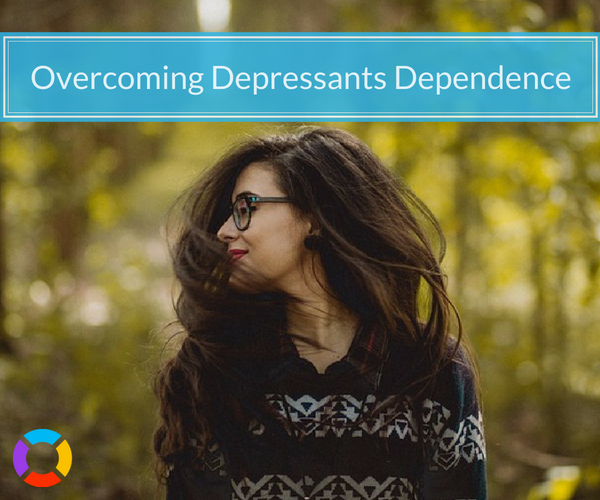Detox from Depressants

Depressants include a wide range of substances including alcohol, some inhalants, and various prescription medications. These depressants are substances that slow down signals sent across your central nervous system (CNS). You may have heard depressants referred to as “downers.”
When used over time, depressants can lead to dependence, which will require detox to break that dependence. Choosing to detox from depressants can be challenging, but the benefits that detox can have on your mind and body are substantial.
In this article:
- What Are Depressants and What Do They Do?
- Withdrawal from Depressants
- How to Detox from Depressants
- Treatment After Detox from Depressants
What Are Depressants and What Do They Do?
Typically, depressants induce a drowsy and calming effect. This sedation makes the substance helpful in treating anxiety and sleep disorders.
Calming occurs as the depressant acts on neurotransmitters in the brain. Specifically, most depressants increase the activity of the gamma-aminobutyric acid (GABA) neurotransmitters. These chemicals are responsible for slowing brain activity.
Depressants include a wide range of substances, and many of them are prescribed medications for sleep or anxiety. These substances include:
- Alcohol
- Barbiturates (e.g., phenobarbital)
- Benzodiazepines (e.g., alprazolam, clonazepam)
- Cannabis
- GHB
- Ketamine
- Opioids (e.g., heroin, morphine, codeine, fentanyl)
- Sedative hypnotics (e.g., zolpidem, eszopiclone)
- Tranquilizers
- Tricyclic antidepressants (e.g., amitriptyline)
Effects of Depressants
As depressants impede messages sent across your CNS, your ability to respond to your surroundings effectively, as well as your coordination and concentration, may falter. Effects from the general use and misuse of depressants may include:
- Light-headedness
- Headaches
- Confusion
- Poor concentration
- Dizziness
- Sleepiness
- Slurred speech
- Dry mouth
- Nausea or vomiting
- Lowered blood pressure
- Slowed breathing
- Decreased movement and memory abilities
- Periods of unconsciousness
Notably, depressants also cause an increased level of impulsivity and impairment in several psychomotor and cognitive functions. When taken in large doses, depressants can lead to overdose and life-threatening consequences.
Withdrawal from Depressants
Given that depressants work by slowing down the brain, when you stop taking them, you may experience a rebound effect. This rebound effect, also known as withdrawal, can result in seizures and other detriments to your health.
Side Effects and Symptoms of Depressant Withdrawal
Often, when people stop taking depressants, they experience withdrawal symptoms. These symptoms can range from mild to severe to life-threatening. Symptoms can begin as soon as six to eight hours after last use (e.g., alcohol) or after several days (e.g., benzodiazepines).
These symptoms of depressant withdrawal can include:
- Agitation
- Anxiety
- Body aches
- Coma
- Confusion
- Cravings or a strong desire to use
- Decreased appetite
- Delirium Tremens
- Depressed mood
- Diarrhea
- Fatigue
- Hallucinations
- Headaches
- Increased blood pressure
- Increased heart rate
- Increased internal temperature
- Insomnia
- Irritability
- Mood swings
- Nausea
- Restlessness
- Runny nose and eyes
- Seizures
- Sweating
- Tremors and shakiness
- Vomiting
- Weight loss
Individuals who are dependent on a depressant should not attempt to stop taking the substance on their own. Withdrawal symptoms for depressants can be severe and sometimes life-threatening.
How to Detox from Depressants
There are several evidence-based approaches to treating substance use disorders. Detox is the first step of this treatment. During this initial step, the body is cleared of substances and physical dependence is broken.
Several types of detox programs are available. Finding the right form of detox is important, as withdrawing from depressants can have severe physical, physiological, and psychological effects. Detox programs for depressant withdrawal are designed to help the body manage the symptoms safely and more comfortably.
Professional Help to Detox from Depressants
When you undergo any detox from depressants, you should be supervised by a medical professional. Your medical provider will examine your risk for serious withdrawal symptoms and provide a recommendation for a specific level of care. Providers will take into account many things, such as:
- Your history of use
- Your frequency and amount of use
- Your use of more than one substance
- Your history of past and existing medical conditions
- Your history of and current mental health condition
For several depressant substances, especially benzodiazepines, detox can include a gradual taper off the depressant. When you seek detox from depressants, your medical provider will work with you to develop a plan and timeline. A benzodiazepine taper varies but could involve:
- Switching your benzodiazepine to a longer half-life alternative
- Reducing your initial dose by 25%-30%, then reducing that dose by 5%-10% each week
- Reducing your dose by 25% each week
- Reducing your dose by 10%-25% each week
- A prolonged taper (i.e., greater than six months)
For other depressant substances, you may be given medications to manage the withdrawal process (e.g., alcohol). Some medications used to treat the withdrawal symptoms of alcohol include:
- Acetaminophen
- Anti-emetics
- Anti-diarrheal meds
- Gabapentin
- Clonidine
- Benzodiazepines
It is common for individuals who misuse one depressant to misuse other forms of depressants or to use multiple depressants together. For example, some people may use benzodiazepines and alcohol, or alcohol and opioids. The use of multiple depressants significantly increases your risk for overdose. When using multiple substances, always speak with your provider about the detox process for all the substances you are using.
Detox services should also include counseling, which will help you through the detoxification process. If you are unable to secure counseling services while completing the detox process, treatment should immediately follow it.
Where to Detox from Depressants
Both detox and counseling can be performed either on an inpatient or outpatient basis. You may benefit from finding agencies that offer detox and treatment services as a whole package.
Possible settings for detox include:
- Social Detoxification: This is accomplished with a support network of friends and family. It is ideal for individuals who do not need medical supervision, are at low risk of serious withdrawal, and have zero to mild withdrawal symptoms.
- Ambulatory Detoxification Without Extended Onsite Monitoring: This includes some medical oversight, such as going to a physician’s office. It is intended for persons with mild withdrawal symptoms.
- Ambulatory Detoxification with Extended Onsite Monitoring: Here, you attend monitoring services for a few hours each day with medical oversight. This is meant for clients who experience mild to moderate withdrawal symptoms.
- Clinically Managed Residential Detoxification: This involves 24-hour supervision. It focuses on treating withdrawal symptoms, involves peer support, and is ideal for moderate withdrawal symptoms.
- Medically Monitored Inpatient Detoxification: This also involves 24-hour supervision but prioritizes maintaining medical stability. It is needed for those who are at risk for severe withdrawal symptoms.
- Medically Managed Intensive Inpatient Detoxification: This requires 24-hour medical care for severe and life-threatening withdrawal symptoms (e.g., psychiatric hospital inpatient center).
Treatment After Detox from Depressants
Once you complete depressants detox, it’s crucial that you transition into a depressants addiction treatment program where you will receive therapies and treatment modalities to help you obtain and maintain sobriety.
Follow-up Care
Follow up addiction treatment can include:
- Relapse prevention medications
- Behavioral therapy
- Combination of both therapy and medication
- Long-term residential treatment
- Short-term residential treatment
- Outpatient treatment programs
- Individualized drug counseling
- Group counseling
- Support groups (e.g., Narcotics Anonymous, Alcoholics Anonymous)
Behavioral Therapies
One type of therapy that has been shown to be effective in helping people stop using benzodiazepines, a common depressant, is cognitive behavioral therapy (CBT). This type of therapy focuses on changing your thinking and expectations.
Additionally, behavioral therapies help motivate people to make changes. These types of therapies can also help with:
- Providing strategies to deal with cravings and stress
- Teaching ways to prevent relapse and avoid continued use of substances
- Coping with relapse
- Improving communication
- Improving relationships
- Improving parenting skills
- Improving family dynamics
Furthermore, behavioral therapies help clients modify their attitudes and behaviors related to drug use and help increase general life skills. Evidence has shown the following behavioral therapies are effective in the treatment of substance use disorders in adults:
- Cognitive behavioral therapy
- Contingency management interventions/Motivational incentives
- Community reinforcement approach plus vouchers
- Motivational enhancement therapy
- 12 Step facilitation therapy
- Family behavior therapy
In addition to the improvement of general life skills, behavioral therapies can provide numerous incentives for people to remain abstinent. For example, many contingency management interventions give participants a monetary incentive after they produce a negative urine drug screen. Other supports, such as 12 Step facilitation, provide peer-based accountability and encouragement to help participants maintain sobriety.
A strong combination of therapy, community support, and other follow-up care can help you establish a solid foundation for long-term recovery from depressant dependance.
Take the First Step to Overcome Depressant Dependance
If you think you may have a substance use disorder and you’re interested in detox and/or treatment, call 800-996-6135 today.
You can also search for detox centers near you.


